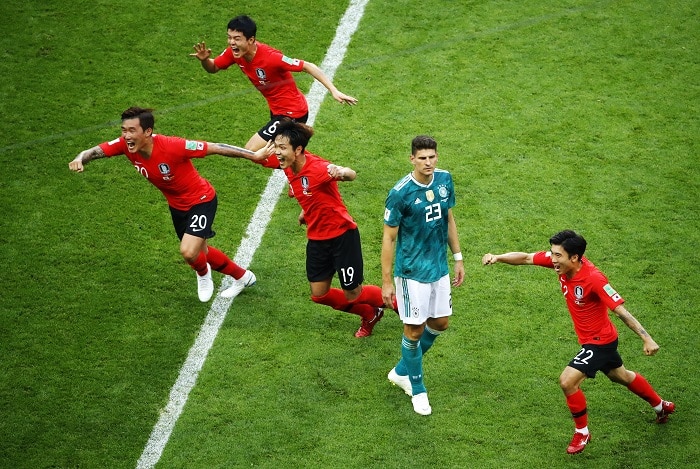One thing that has become apparent in this World Cup is that no one is guaranteed a win. The gap between the best and the rest is closing, and any hint of complacency can cost you – just ask Germany. DEAN WORKMAN explores.
When the group stage draw for the World Cup took place, a number of the heavy-hitters would have undoubtedly been pleased with the teams they were set to face.
Sure, Portugal and Spain were in the same group but the other two teams – Morocco and Iran – were never really going to trouble the European giants, were they? Well, at least that’s what we thought.
READ: Messi, Neymar headline WC Team of the Round
Morocco pushed Portugal all the way in a nervy 1-0 win before a 1-1 draw against Iran almost cost them a place in the next round. Likewise, Spain showed similar struggles as they only managed to edge Iran 1-0 before needing a late equaliser in a 2-2 draw with Morocco to secure a spot in the knockout rounds.
Certainly, no bankers for the betting men in that group then.
The mighty Argentina were drawn in a group with Iceland, Croatia and Nigeria and progression seemed straightforward. Their opening game against Iceland saw them come up against the smallest nation ever to compete in the World Cup, yet they only managed a 1-1 draw. A second-round loss to Croatia put the South Americans on the brink of a first-round exit. They, however, managed to escape the embarrassment of a group-stage exit with a late winner against Nigeria. It was by no means straightforward for Messi and co, who finished second behind Croatia.
Unlike Argentina, Germany were not so lucky: the defending champions were knocked out at the group stage for the very first time. The Germans were favourites to top their group but losses to Mexico and South Korea, in their first and third games respectively, saw Die Mannschaft finish bottom of their group and exit the World Cup, while Sweden and Mexico progressed.
READ MORE: Power rankings: Who wins the World Cup?
Brazil topped their group after a slow start as Switzerland finished second. France also topped their group, followed by Denmark, despite being largely uninspiring in their group games.
Only England and Belgium dominated their group as both won their opening games to secure early progression.
The top teams certainly haven’t had their own way up to now and that is largely down to the improvement of the so-called lesser nations. Sure, they may not be the most attractive teams to watch but the smaller teams have certainly found a way to compete with the world’s best.
This is down to the combination of more players plying their trade across Europe, better youth development structures and better coaches, who have their teams well drilled and organised.
READ: Belgium beat England to top Group G
These teams and their coaches understand that they will not be able to outplay some of the bigger footballing nations, but this hasn’t stopped them from finding a way to best use their ability and close the gap between themselves and the traditional heavyweights.





